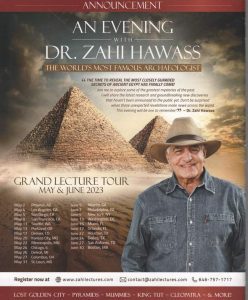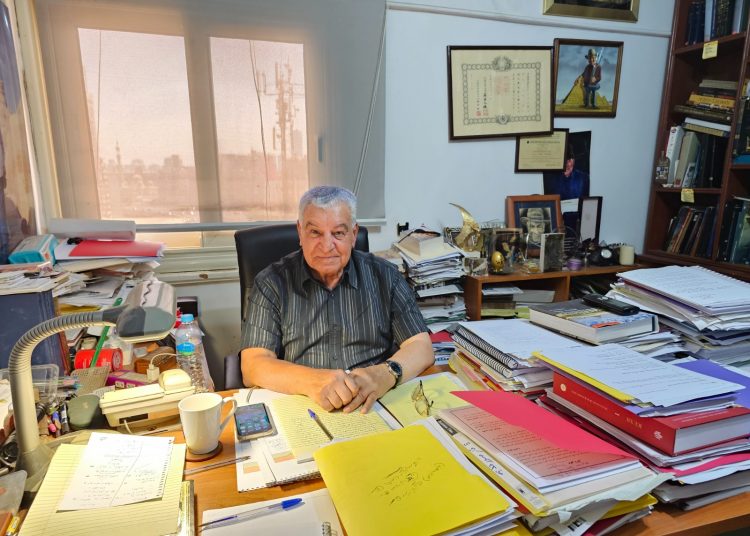Having concluded his lecture about ancient Egypt at Columbus, Ohio, world-renowned archaeologist Zahi Hawass asks the audience whether they have any questions. An Afro-American woman stands up and asks: “Why do you attack us?”
This is not the first time this question has been bluntly put by many black people in the US. Hawass has visited 23 states and delivered as many lectures during his May and June tour this year.

In his interview with The Egyptian Gazette, Hawass said this is the first time that an archaeologist has given this number of lectures in the US to audiences of between 1,300 and 2,000, including supporters of Afrocentrism.
“In Los Angeles, I found a number of black people holding placards which read that they are the origin of the pharaonic civilisation and that the Arabs stole the civilisation. There were also placards insulting me for refuting these claims,” Hawass said.
“In New York, a number of black people made a petition demanding withdrawal of my doctorate from Pennsylvania University. The petition was signed by 24 persons, claiming that I changed history.”
Hawass said that before each lecture there is an hour’s photo call, a book signing, a short film about himself, followed by his 80-minute lecture and a question-and-answer session.
“When the woman asked me this question, I replied, ‘No I didn’t attack you, but let’s discuss the evidence that refutes the claim of ancient Egypt’s black African origins’,” he said.
“There was a Kingdom called Kush in Nubia, centred along the Nile Valley in what is now northern Sudan and southern Egypt,” he went on.
“Ancient Egyptians always defeat them as a result of the hostility that occurred between them and the ancient Egyptian civilisation. They did this to create stability on the southern border of the country.
“When Dynasty 25 took power, it was the last stage of the pharaonic era, people of Kush came to rule Egypt for two years, which means during the Late Period, not at the beginning of the pharaonic civilisation.
“So did the two years mean that they were the origins of pharaonic civilisation? Of course not.”
Hawass pointed out that scenes in Egyptian temples depict the king, whether in Old, Middle and New Kingdoms, smiting his foes, who were African, Libyan, Mesopotamian. The king’s features are totally different from those of his enemies.
The originators of the pharaonic civilisations are the Egyptians themselves, he said.
“African countries and Egypt share the same Nile. But the ancient Egyptian civilisation occurred here in Egypt, not in any other African country,” said Hawass, who has written 60 books on all aspects of Egyptian antiquities and is currently working on a three-part encyclopaedia on the pyramids.
Egypt is the only country in Africa that has the materials with which the ancients used to build their civilisation, he said.
“The granite came from Aswan, diorite from Nubia, sandstone from Kom Ombo, alabaster from Het-Nub in Middle Egypt, white limestone from Tura, basalt from Fayoum and turquoise and copper from Sinai. Egypt also has plenty of gold,” he explained.
Egyptians imported silver from Syria and Palestine, and also imported lapis lazuli from Afghanistan.
“So, the elements of civilisation already existed in Egypt,” he said.
In addition, he added, the ancient Egyptian civilisation is based on a belief in the afterlife, which induced them to construct pyramids and build their civilisation, Egypt.
“So, I told the woman who asked the question that from these clues, [black people] don’t have any relation with the origins of pharaonic civilisation.”
Her reaction to his reply was so surprising, it brought Hawass close to tears.
“The woman told me that we know that your birthday is tomorrow [May 28], so we want to sing for you.
“Then she and 50 other black people in the hall and the rest of the audience sang ‘Happy Birthday’. I felt a lump in my throat,” Hawass, 76, said.

“For hundreds of years, when the black people went to the United States they felt that there were a minority, so they started to claim that ancient Egypt has black origins.
“In Brazil, there is a huge parade held yearly in Sao Paulo. Many people come to attend this 2-kilometres-street parade. I myself saw a replica of ancient Egyptian temples and tombs and a black couple dressed as pharaohs.
“Again such a parade celebrates the Kush Kingdom, which existed in modern-day Sudan and came to prominence in the Late Period, not the origin of ancient Egyptian civilisation.”
Regarding the origin of ancient Egyptians, Hawass agreed with father of Egyptology British Egyptologist Flinders Petrie (1853-1942), who carried out an excavation in Naqada in Qena governorate, 20 kilometres north of Luxor, found a pre-Dynastic cemetery, and said those who were buried there were the people who had made the ancient Egyptian civilisation.
Hawass said that recently black people depend on their celebrities to spread their claim.
He mentioned “Queen Cleopatra VII” in the four-part docuseries ‘African Queens’, on Netflix aired on May 10. He said they used Jada Pinkett Smith, the executive producer of the series, to promote Afrocentric thinking.
“When we say that she is not black, it doesn’t mean we diminish the black people. I will also refuse if a blonde actress portrayed Cleopatra in a documentary. Cleopatra was neither black nor blonde. She came from a Greek Macedonian family,” he said.
Hawass responded with a 90-minute documentary about Cleopatra streamed on the same day of airing the Netflix controversial docudrama.

It was shown on Amazon Prime, Local Now, and YouTube featuring Hawass, Dominican lawyer and archaeologist Kathleen Martinez, independent filmmaker Curtis Ryan Woodside, Biomedical Egyptologist Sofia Aziz and others.
The film showed statues known to be Cleopatra’s and numerous coins which had no relation to what appeared in the controversial docudrama.
“I also wrote many articles refuting these claims. As a result of this propaganda, those archaeologists who took part in the Netflix film said they were deceived.
“The Netflix docudrama failed,” he said. “Our documentary was watched more than theirs,” he added.
Hawass believes that boycotting the platform or cancelling Afrocentric-related lectures is not the solution.
“We can easily refute their claims at these debates, or any produced work. Boycotting or cancelling their events will increase their enthusiasm and let them wrongly think they are true.
“When Netflix aired the controversial docudrama on Cleopatra we condemned the work, but at the same time, we didn’t boycott the platform.
“The platform is not against Egypt. But it is an open platform that airs different opinions, views and topics. As it broadcast the controversial Cleopatra, they also presented the documentary “Unknown: The Lost Pyramid” on July 3, which was number one on the platform for two weeks.”
He refers to the film directed by Max Salomon and was shot in Saqqara, the latest Egyptian archaeological hotspot. It features Hawass in the quest for the long-lost pyramid of a forgotten Egyptian king while his protege and rival, Mostafa Waziry, searches for an unlooted tomb in an ancient necropolis. The documentary highlights the idea of reclaiming Egyptology for Egyptians and ensuring that the next great find is made by Egyptians.
But, in some cases, Hawass said, crucial decisions must be taken against those supporting Afrocentric.
He referred to the recent decision taken by Supreme Council of Antiquities Secretary General Waziry to ban the Dutch archaeology team from from continuing its work in Saqqara due to the fact that an exhibition at the National Museum of Antiquities (RMO) in Leiden falsifies history with its Afrocentric approach.
The museum’s team of archaeologists has been carrying out annual excavations there for more than 40 years.
“It is a 100 per cent correct decision,” Hawass, a former minister of antiquities, said.
“Their showing the depiction of ancient Egypt by black artists indicates that they support Afrocentrism, although they didn’t say that explicitly. It seems that they held this controversial exhibition to increase the income of the museum, but in the end it is a falsification of history. So their mission must be stopped,” he said.






Discussion about this post